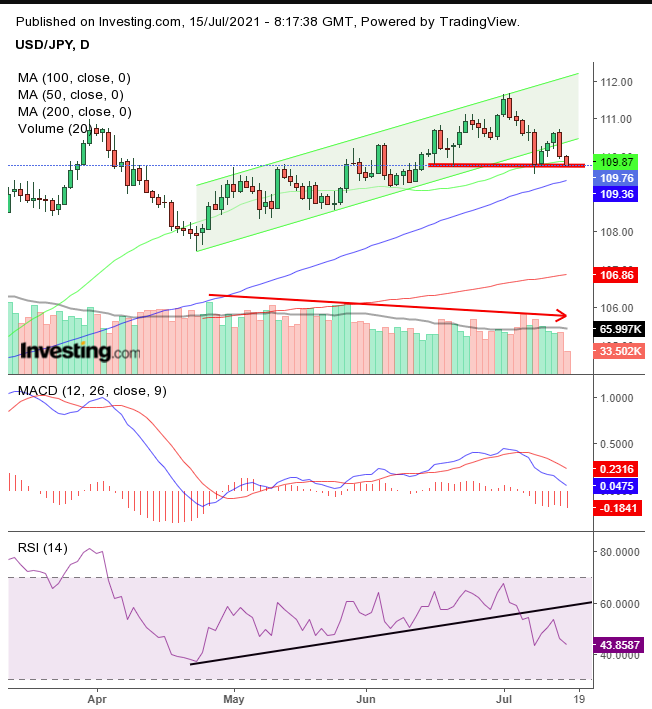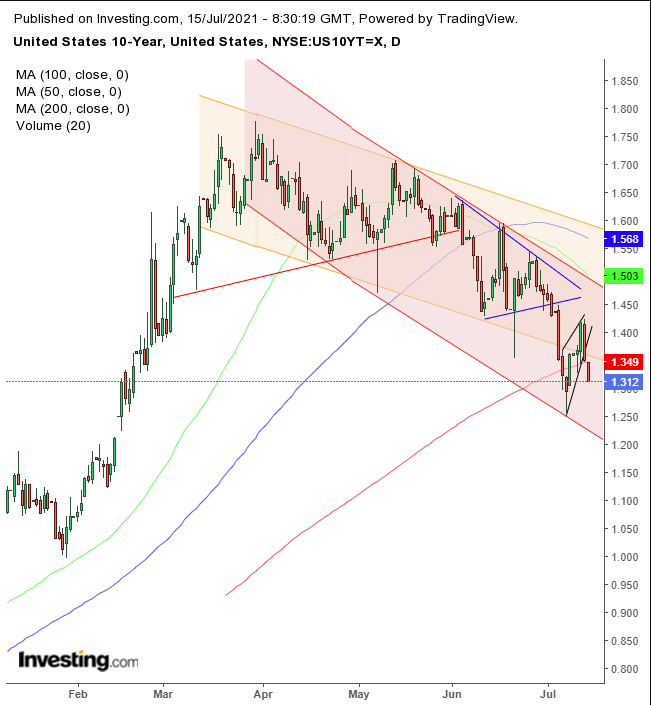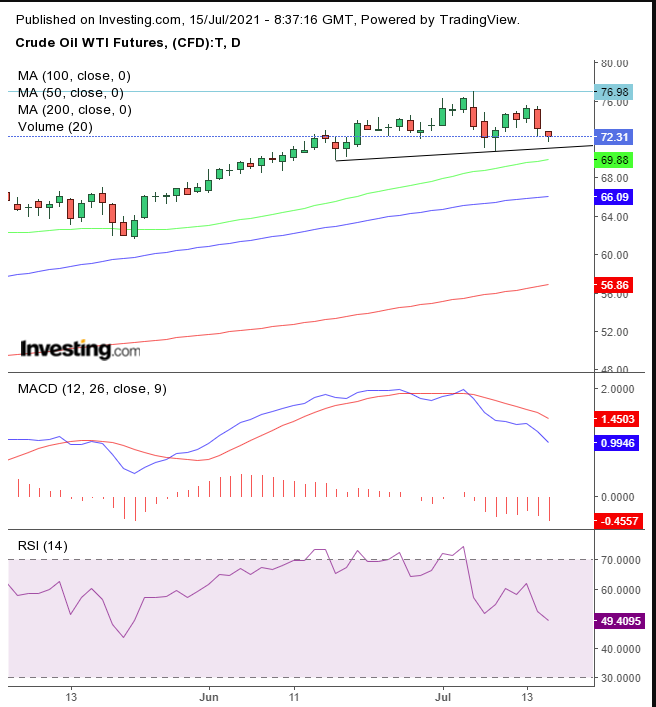- Fed's Powell said recovery not strong enough to remove accommodation
- China’s growth slows
- Oil extends selloff
Key Events
US futures contracts on the Dow, S&P, NASDAQ and Russell 2000 have been trading unevenly ahead of the US session on Thursday and most are currently heading lower. Equities in Europe declined along with the price of oil, pressured by rising stockpiles, as traders weighed slowing expansion in China with yesterday's dovish rhetoric from Fed Chair Jerome Powell.
Yields returned to declines and gold is currently rising.
Global Financial Affairs
In a show of force for tech stocks, which outperformed during coronavirus lockdowns, contracts on the NASDAQ 100—the index most associated with growth stocks—were the only ones in the green at time of writing, +0.13%. On the opposite end of the cyclical rotation, Russell futures—whose small cap domestic firms listed on the underlying index benefit from economic recovery—were 1.6% in the red, with futures on the Dow—whose listed blue-chip megacaps also represent the value sector—0.5% in negative territory.
European shares extended Wednesday’s drop, pressured by the oil majors as well as weakening commodity prices. However, stocks on the other end of the spectrum, including wind energy, also fell as “another big stock-market rotation is underway," according to the Wall Street Journal, while US inflation, which is showing no signs of slowing, is at its highest level since 2008.
Earlier, Thursday's Asian session painted an unclear picture for traders. Japan’s Nikkei 225 led the declines, with a 1.1% loss, as a stronger yen drove stocks lower, one month after Japanese exports surged by almost 50%, recording the sharpest rise in 41 years.
As the world’s fourth largest importer and exporter of goods, with foreign trade accounting for over a third of the country’s GDP, a stronger yen renders their exports less competitive on the global market, potentially upsetting its trade balance.

The dollar-yen pair was threatening to complete a small H&S top, after falling out of its rising channel. Volume, momentum and a broad spectrum of pricing—all provided negative divergences to the pair’s advance since the Apr. 23 low.
On the other hand, China’s Shanghai Composite outperformed, adding 1%, as better-than-expected retail data overshadowed the Asian nation's growth slowdown.
JPMorgan strategist, Mixo Das is suggesting that now may be the ideal time to invest in Asian stocks, with light trade positioning, tempered valuations and expectations of 60% to 70% annual growth in corporate results.
Megacaps led a rally during yesterday’s US session led by defensive stocks. The Energy sector plummeted 3%, more than 6 times the second-worst performer, Financials, which declined less than 0.5%, after Federal Reserve Chair Jerome Powell outlined why monetary stimulus should remain in his testimony to Congress. Powell argued that the recovery, such as it is, does not thus far warrant scaling back the Fed’s unprecedented support.
Ironically, up until now whenever the economy looked like it may be in difficulty, investors have turned extremely bullish, counting on continued ultra-loose accommodation from the Fed to support markets. This is the first time in memory that stocks only rose slightly with Apple (NASDAQ:AAPL), Alphabet (NASDAQ:GOOGL) and Microsoft (NASDAQ:MSFT)—the usual suspects to benefit from a slowing economy—reaching records.
Yields on the 10-year Treasury note fell for the second day, below 1.4%, after Powell warned inflation—which he has been consistently downplaying since the start of the year—is likely to remain high in the coming months, before easing. This rhetoric suggests the Fed will be tolerant of inflation overshooting their 2.00% target, before it tightens.

Yields crossed below the 200 DMA, completing a rising flag, bearish after the preceding sharp decline, following a bearish triangle, which followed a top. In this chain of bearish patterns, rates will now test the bottom of the faster (red) declining falling channel.
The dollar dipped lower for the second day, at a more tempered rate than the slide in yields.
Bitcoin fell further, to its lowest level since June 25.
Oil extended a selloff after data revealed US stockpiles gained, and China angles to competes with the US as the world’s largest refinery. Chinese companies processed a record volume of crude in June. Meanwhile OPEC+ is nearing a deal.

Crude’s second day decline found support at the neckline of a small H&S top, whose bearish outlook is supported by both the MACD and the RSI. For clues to the demand side of the oil equation, there's one surprising metric traders should watch.
Up Ahead
- Powell will testify today for the second day to the Congressional Financial Services Committee.
- On Friday the Bank of Japan announces its interest rate decision.
Market Moves
Stocks
- The STOXX 600 fell 0.5%
- Futures on the S&P 500 fell 0.3%
- Futures on the NASDAQ 100 rose 0.1%
- Futures on the Dow Jones Industrial Average fell 0.4%
- The MSCI Asia Pacific Index rose 0.2%
- The MSCI Emerging Markets Index rose 0.8%
Currencies
- The Dollar Index was little changed
- The euro was little changed at $1.1829
- The Japanese yen rose 0.2% to 109.78 per dollar
- The offshore yuan was little changed at 6.4612 per dollar
- The British pound fell 0.3% to $1.3823
Bonds
- The yield on 10-year Treasuries declined three basis points to 1.32%
- Germany’s 10-year yield declined one basis point to -0.33%
- Britain’s 10-year yield declined two basis points to 0.61%
Commodities
- Brent crude fell 1.6% to $73.58 a barrel
- Spot gold rose 0.2% to $1,831.64 an ounce
